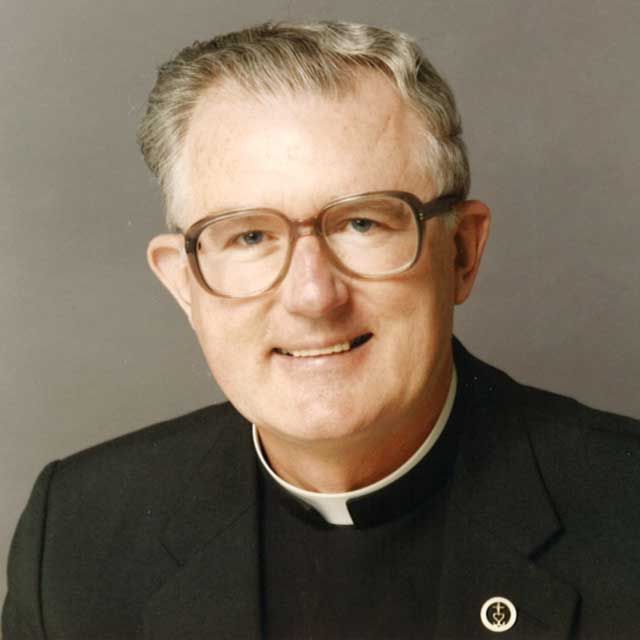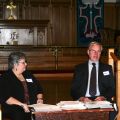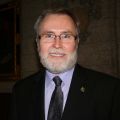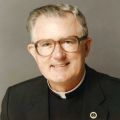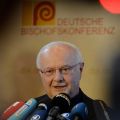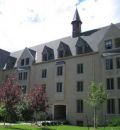NEWS
Friends and colleagues mourn the passing of Fr. Carl Matthews
By Evan Boudreau, The Catholic RegisterCatholic education, the Jesuit community and the Church suffered a great loss on Sept. 26 with the passing of Fr. Carl Matthews.
"It was the significant end to an era," said Ottawa Archbishop Terrence Prendergast, a Jesuit himself who'd known Fr. Matthews for 50 years. "I saw him in August and noticed how frail he was but he was quite upbeat. He always had a positive attitude."
Fr. Matthews, 80, died peacefully at Rouge Valley Hospital in Ajax, Ont. Since retiring from parish life in 2010, he had lived at the Rene Goupil Jesuit Infirmary where his health deteriorated.
"He would probably thought it quite fitting that he died on the Feast of the Canadian Martyrs; that was an important devotion for him," said Prendergast. "He went very quickly at the end. People were expecting him to hang on for another week or two but the Lord called him home on that feast day."
Fr. Matthews, ordained on June 4, 1966, played many roles within the Catholic community. He was a priest, publisher of The Catholic Register for three years and served for 14 years as a trustee and then chair of the Metropolitan Separate School Board, the precursor of the Toronto Catholic District School Board. He made his most lasting mark in education, where he was an instrumental figure in establishing full funding for Ontario Catholic schools.
"I would say that he was in love with Catholic education and was a brilliant and dogged defender of our Catholic schools and our right to full funding," said historian Michael Power, author of the 2005 biography Jesuit in the Legislative Gallery: A life of Father Carl Matthews, S.J. "He learned a lot from his father who was a school inspector, but he was essentially self taught in the matter of school finances. He engineered the clinching deal on full funding."
Fr. Matthews' involvement in the funding debate began when Cardinal Gerald Emmett Carter returned from Rome in 1979 following his elevation to cardinal by Pope John Paul II. Carter, archbishop of Toronto, pulled Fr. Matthews aside and told him that the one thing he hoped to accomplish as a cardinal was to secure full publicly funded Catholic education in Ontario.
Carter asked Fr. Matthews to draft a brief but compelling argument to present to the government on the matter.
"So he left the room and within three weeks had a 12-page memorandum written," said Power. "He never heard another thing about it until in 1984 he got a call from the Cardinal's office saying listen, the premier has phoned the Cardinal asking for another copy of that memorandum. Shortly thereafter the big announcement was made."
Prior to the 1984 announcement, the province only provided subsidies up to grade 10 for Catholic schools, leaving students in grades 11, 12 and 13 to pay tuition costs.
Born in Kingston, Ont. Fr. Mattews attended his hometown's Regiopolis College before entering St. Stanislaus Novitiate in Guelph, Ont. in 1951. After first vows and two years of Juniorate, he went on to Regis College in Toronto. Fr. Matthews returned to his former high school and taught for two years before returning to the University of Toronto to formally study education — a life-long vocation of the late father.
Although he will be remembered for his tireless dedication to his many areas of commitment, one pastime took Fr. Matthews mind off everything else — baseball.
"He loved going to the Blue Jays (but) never treated himself to a half-decent seat," said Power, who attended many games with Fr. Matthews after they first met in the early '90s. "We always sat up in the 500 section and I'd say why are you sitting up here? I came all the way from Welland to sit up in the sky?
"So the last game we went to I had four very good tickets, courtesy of a friend of mine, so we sat behind the Blue Jays' dugout. He just marveled."
Power described Fr. Matthews as a true priest, a good man and genuinely humble human being. He drove a small car, had a modest apartment and always gave what he could to those in need.
"He did splurge for his TV, he subscribed to Rogers Sportsnet or whatever it is that carries the Blue Jays games," said Power. "For him that was almost a mortal sin, but I said listen, you like baseball, watch the games."
Fr. Matthews was a lot of things to a lot of people. To Power he was a boss, a man of God and most of all a friend.
"What I'll miss is just Carl, I don't know how else to say it," said Power. "The bond of true friendship is never broken, death cannot break that, but there is a loss. He's not here, he won't be phoning me anymore, he won't be writing me anymore. I will miss him."
Church Council on Justice and Corrections making a difference for 40 years
By Erin Morawetz, The Catholic RegisterOTTAWA - At the 40th anniversary of the Church Council on Justice and Corrections (CCJC), a message rang out loud and clear: “CCJC, the mission, the motto, the vision, serves as a shining light for restorative practices in justice and in corrections,” said Rev. Dr. Pierre Allard.
Allard, professor of restorative justice at Queen’s University’s school of religion in Kingston, Ont., was the keynote speaker at the anniversary celebration on Sept. 27, an evening spent looking back at past achievements and forward toward a bright future for CCJC, a multi-denominational, faith-based organization.
CCJC was founded in September 1972. It formed as a coalition of multiple Christian groups, including the Canadian Conference of Catholic Bishops, the United Church of Canada and the Anglican Church of Canada.
Over the last 40 years, the council has been an active voice lobbying for a more community based, restorative process of justice that welcomes ex-inmates back into society. It opposed the death penalty in the 1980s, and more recently, the tough-on-crime Bill C-10.
A recent landmark project for the council is “Circles of Support and Accountability” (CoSA), a five-year program funded in large part by the federal government.
Jill Bench, CoSA’s current national project manager, said the program helps former inmates, including sex offenders, find housing and employment, but its main purpose is to provide them with friendship.
“Nobody wants them back into the community,” she said. “It’s difficult enough. We provide support, we provide friendship.”
The program has met with great success since its implementation in 2009, with research showing a reduction in re-offending rates by up to 80 per cent for male participants.
Still, Nancy Steeves, the council's incoming president, said she worries about how much government funding the project — and CCJC in general — will have in the near future, with so many budget cuts.
Bench, however, is hopeful the government will see the benefit of programs like CoSA, and continue with even more consistent funding.
“I’m hoping … the evaluation (will) show that the concept of CoSA makes a difference,” she said.
And making a difference was certainly the theme of the evening.
Outgoing president Laurent Champagne, whose two-year term ended at the board’s annual general meeting the same night, said members should continue to stress the importance of restorative justice.
“I hope that we will continue not only surviving, but be a light — be a light for all these people who don’t really understand what the justice system is, what reintegration is, what restorative justice means, because they just believe in vengeance,” he said. “They are not seeing the people — the man, the woman — behind the crime.”
He urged of his fellow board members, “Be spokespeople for us in your place, in your community.”
(Morawetz is a freelance writer in Ottawa.)
MP introduces motion condemning sex-selective abortion
By Catholic Register StaffOTTAWA - MP Mark Warawa is seeking the support of his colleagues in the House of Commons in condemning sex-selective abortion.
"Recent studies have shown that the practice of aborting females in favour of males in happening in Canada," said Warawa, adding that polls show more than 90 per cent of Canadians believe the practice should be illegal.
Motion 408 is in response to numerous inquiries and concerns his office received after the CBC presented an investigation on gender selection last June. With hidden cameras, the CBC visited 22 private ultrasound clinics in Canada. They found that most of these clinics allowed ultrasounds to tell the sex of the baby so that the parents could choose to terminate the pregnancy if the unborn child was a female.
Unequivocal condemnation from Parliament will send a strong message that will help to bring an end to this form of gender discrimination in Canada, said Warawa.
Warawa introduced Motion 408 on the heels of the defeat of fellow Conservative MP Stephen Woodworth's Motion 312. Woodworth was trying to foster a debate about when human life actually begins. His motion was defeated Sept. 26.
The motion has already garnered the support of the Catholic Civil Rights League of Canada.
"In light of the defeat of Motion 312, it's encouraging to see a new private member's motion aimed directly at condemning abortions performed for gender selection," said Joanne McGarry, league president, in a statement. "The league supports this motion and will be following it closely."
'VatiLeaks' trial will be landmark event for Vatican tribunal
By Cindy Wooden and Carol Glatz, Catholic News ServiceVATICAN CITY - For the Vatican's criminal court, the trial of Paolo Gabriele and Claudio Sciarpelletti for their alleged part in leaking papal correspondence will be unusual and may lead the Vatican to invoke a never-used co-operation agreement with Italy.
Celebrate! closes its doors
By Ramon Gonzalez, Canadian Catholic NewsAfter more than five decades providing high-quality pastoral and liturgical resources to Catholic parishes and people in ministry, Celebrate! magazine is shutting down due to increasing publication costs.
Novalis Publishing says the challenge of increasing costs prevented the magazine from breaking even financially.
While readers and organizations did much to sustain its life, Novalis decided to close the publication with the Fall 2012 issue. Readers can continue to access the magazine’s content at www.celebrate-liturgy.ca until Dec. 31.
Originally known as Homiletic Service, the magazine was launched in 1961 on the eve of the Second Vatican Council.
“We are deeply saddened to see the end of this excellent publication which gave so much to Catholics deeply engaged in the daily life of their Church,” said Joseph Sinasac, publishing director of Novalis. “Yet we remain committed to developing an online alternative for serving all those involved in the life of the Church.”
Sinasac also praised the work of its Edmonton-based editor Bernadette Gasslein for raising the journalistic standards to a high level over her 21 years at the helm.
“Under Bernadette’s passionate leadership, the magazine won from the Catholic Press Association and the Canadian Church Press dozens of awards for both its content and presentation,” he said.
In spite of having lost her job as editor, Gasslein is not idle. Currently she is assisting her husband Gordon Andreiuk, an Edmonton lawyer, and is doing some writing for an American publisher and for The Prairie Messenger.
“So I’m not really out of a job,” she said. “I also have a book coming out with Novalis in early spring.” The book, which she described as an imprint of Living with Christ, is a small 32-page book called Living with the Prayers of the Mass.
Celebrate! began in 1961 and was designed to offer homilists the new scholarship that was emerging. In 1988, when the name was changed to Celebrate! the focus broadened to include material for formation for all liturgical ministers and catechists. It was described as “a magazine for catechists, religion teachers, homilists and liturgy planners.”
The magazine has always been addressed to a “niche audience” in the sense that it is designed for ordained and lay ministers, said Gasslein.
“That is by nature a relatively small audience, and it is also a difficult audience to contact because lay ministers, unless they are on staff at parishes, change frequently.”
At last count, Celebrate! had a circulation of around 5,000.
Regular features in the magazine include material on children’s spirituality, ministry to youth and young adults, Christian initiation, formation for Eucharist, the connection between liturgy and social justice, catechesis and music ministry, and a special section designed for Catholic teachers.
Motion 312 defeated, but wins support of 10 cabinet ministers
By Deborah Gyapong, Canadian Catholic NewsOTTAWA - The defeat of Conservative MP Stephen Woodworth's Motion 312 Sept. 26 was expected, but the level of support, including that of 10 cabinet ministers, came as a welcome surprise to pro-life groups and political journalists.
Defeated 203 to 91, Motion 312 was supported by 87 Conservatives, a majority of the 163-member Tory caucus, as well as four of 35 Liberal MPs.
The Conservative MP's Motion 312 would have set up a parliamentary committee to examine the 400-year-old definition of when human life begins.
Immigration Minister Jason Kenney, a devout Catholic, was the first cabinet minister to publicly announce he would support the motion. The votes of the other cabinet ministers were not anticipated however. It garnered the support of Status of Women Minister Rona Ambrose, Government House leader Peter Van Loan, National Revenue Minister Gail Shea, Trade Minister Ed Fast, Intergovernmental Affairs Minister Peter Penashue, International Co-operation and CIDA Minister Julian Fantino, Agriculture Minister Gerry Ritz, Foreign Affairs Secretary of State Diane Ablonczy and Minister of State for Seniors Alice Wong.
Prime Minister Stephen Harper respected the House tradition of free votes on private member's business, something the New Democratic Party was not prepared to do, said Woodworth at a news conference following the vote.
"NDP members, with their extreme personal preoccupation with abortion, actually suggested that we give the Prime Minister power to veto private members' motions," he said. "Can you imagine. They propose to take away one of the most effective democratic tools left to MPs in the face of an MP's diminishing role."
Woodworth said he'd done his job by exposing Subsection 223(1), "the most vile, most unjust law in Canada." It rules that a human life does not begin until a baby is actually born.
Though opponents of Motion 312 have said the abortion debate is settled and the courts recognize a right to abortion, Woodworth pointed out Justice Bertha Wilson in the 1988 Morgentaler decision left the question of protection for unborn life to Parliament. That means the question of how to honour universal human rights in Canada "will remain open and unresolved," he said.
"This issue was never closed, it's not closed now and will never be closed if we in Parliament continue to stick our collective head in the sand," he said.
He remarked on the huge volume of mail mostly in favour of the motion, the hundreds of petitions with thousands of signatures that showed both women and men supported it. The volume of mail was so big it clogged up the Parliamentary post office, he said.
"I want Canadians to remember that no great issue is ever determined by a single vote in the House of Commons," he said. "It remains for the Canadian people to rise up even more strongly in defence of honest laws and universal human rights, which are so shamefully violated by subsection 223(1)."
"I think Canadians will conclude that much of what was said by those speaking against Motion 312 in the Parliamentary debate lacked any logic or coherence," he said. "Many speakers against Motion 312 showed they were willing to abandon time-honoured Canadian values in a single-minded personal preoccupation with abortion no matter how grave the consequences."
Campaign Life Coalition national organizer Mary Ellen Douglas congratulated the MPs who had the courage to vote for the motion.
"We hope this will give them the courage to continue to bring up the issue in Parliament as often as it takes to obtain a law," she said.
She said all of the identified pro-life MPs except for a couple were accounted for in the vote. But many others not identified as pro-life also supported it.
"The point is they were presumably voting on freedom of speech," she said, noting "pro-aborts" have said the issue "cannot even be discussed in Parliament."
"Although the motion was defeated, it was very encouraging to see the subject brought forward, as well as the groundswell of support through meetings with MPs, e-mails, letters, phone calls and petitions," said Catholic Civil Rights League executive director Joanne McGarry.
"We thank Mr. Woodworth for proposing the motion, and all those MPs who supported it and thereby kept respect for life on Canada's agenda," McGarry said in a statement. "This particular motion has been defeated, but the debate on this issue, which many Canadians believe is anything but 'settled,' will continue until Canadian law recognizes the humanity of the unborn."
WeNeedaLAW.ca represents a grassroots campaign to bring about federal restrictions on abortion. Its director, Mike Schouten, defended Ambrose against an attack by Abortion Rights Coalition of Canada spokeswoman Joyce Arthur who accused the minister of throwing "women under the bus" and described her vote as a "slap in the face to the women of Canada."
"The Abortion Rights Coalition of Canada is a group of extremists who advocate for abortion on demand through all nine months of pregnancy," said Schouten in a Sept. 27 release. "Not only does Ms. Arthur continually misinterpret the Supreme Court decision in 1988, she also advocates for the legality of late-term and sex-selective abortions."
Former Register publisher Fr. Carl Matthews passes away
By Catholic Register StaffArticle has been amended for updated information on Fr. Carl Matthews' wake
TORONTO - Fr. Carl Matthews, S.J., a former publisher and editor of The Catholic Register, died Sept. 26. The 80-year-old Fr. Matthews was in his 62nd year of Jesuit life.
Fr. Matthews died peacefully at Rouge Valley Hospital in Ajax, Ont. He had been at the Rene Goupil Jesuit Infirmary as his health deteriorated since his retirement from parish life in 2010.
It is Fr. Matthews' dedication to Catholic education where he made his name. He served for 14 years as a trustee with the Metropolitan Separate School Board, the predecessor of the Toronto Catholic District School Board, and is among those most responsible for full funding being extended to Catholic schools. Along with the late Cardinal Gerald Emmett Carter, Fr. Matthews worked tirelessly in the halls of Queen's Park to bring equal funding to Catholic high schools, which up until 1984 were only fully funded up until Grade 10.
In the early 1990s, Fr. Matthews was publisher and editor of The Catholic Register before returning to parish life. He spent 16 years, from 1994-2010, as pastor of St. John the Evangelist parish in Waubaushene, Ont., on the shores of Georgian Bay in the northern reaches of the archdiocese of Toronto.
Born in Kingston, Ont., in 1932, Carl Joseph Damien Matthews attended Regiopolis College in his hometown before entering St. Stanislaus Novitiate in Guelph, Ont., in 1951. After first vows and two years of Juniorate, he went on to Regis College in Toronto. He returned to Regiopolis to teach for two years before returning to the University of Toronto to study education.
Fr. Matthews was ordained a priest June 4, 1966. He served in a number of parishes in the archdiocese, including Martyrs' Shrine in Midland, Ont., Good Shepherd parish in Thornhill and St. Michael's Cathedral.
A wake will be held for Fr. Matthews on September 30th from 2-4 p.m. (service at 3 p.m.) at Manresa Retreat House in Pickering, Ont., and from 7-9 p.m. at Rosar Morrison Funeral Home, 467 Sherbourne St. in Toronto. The funeral will be held at 10:30 a.m. on October 1st at Our Lady of Lourdes Church, 520 Sherbourne St. Burial is at the Jesuit Cemetery in Guelph.
German bishops defend exclusion of Catholics who stop paying tax
By Jonathan Luxmoore, Catholic News ServiceWARSAW, Poland - The German bishops' conference defended a controversial decree that said Catholics who stop paying a Church membership tax cannot receive sacraments.
"There must be consequences for people who distance themselves from the Church by a public act," said Archbishop Robert Zollitsch of Freiburg, conference president, in defending the Sept. 20 decree.
"Clearly, someone withdrawing from the Church can no longer take advantage of the system like someone who remains a member. We are grateful Rome has given completely clear approval to our stance."
The archbishop said each departure was "painful for the Church," adding that bishops feared many Catholics were unaware of the consequences and would be "open to other solutions."
"The Catholic Church is committed to seeking out every lost person," said Zollitsch, whose remarks were reported by Germany's Die Welt daily.
"At issue, however, is the credibility of the Church's sacramental nature. One cannot be half a member or only partly a member. Either one belongs and commits, or one renounces this."
Catholics make up 30 per cent of Germany's population of 82.3 million, about the same proportion as Protestants.
Interest in the Catholic Church revived after German-born Pope Benedict XVI's April 2005 election, but Church baptisms and weddings continue to decline. Church statistics show that about 13 per cent of Catholics attend Mass weekly, compared with 22 per cent in 1989. Germany's Catholic priesthood and religious orders also are declining in number, according to a bishops' statement in June, despite three homecoming visits by Pope Benedict since his election.
A total of 126,488 Catholics asked to stop paying the membership tax and be removed from registers in the 27 German dioceses during 2011, according to the bishops' conference. In 2010, some 180,000 Catholics took the same step.
German newspapers said the Pope's native Bavaria region had suffered the worst losses. The dioceses of Augsburg, Bamberg, Eichstatt, Passau and Wurzburg reported a 70 per cent increase in departures in 2010, the height of the clergy sexual abuse scandal.
Introduced in the 19th century, the membership tax earns the German Church about $6 billion annually, making it one of the world's wealthiest.
In its decree, the bishops' conference said the tax was designed to compensate for state seizures of Church property. The decree said the right to a "civil law withdrawal" ensured "no one is led to Church membership against their will."
"Conscious dissociation from the Church by public act is a grave offense against the Church community," the decree said.
"Whoever declares their withdrawal for whatever reason before the responsible civil authority always violates their duty to preserve a link with the Church, as well as their duty to make a financial contribution so the Church can fulfill its tasks."
The document added that departing Catholics could no longer receive the sacraments of penance, holy Communion, confirmation or anointing of the sick, other than when facing death, or exercise any Church function, including belonging to parish councils or acting as godparents. Marriages would be granted only by a bishop's consent and unrepentant Catholics would be denied church funerals, the decree said.
A press release Sept. 20 said the decree had been approved in August by the Vatican's Congregation for Bishops. It added that parish priests would be asked to write to departing Catholics, inviting them to meet and explain their decision and have the consequences explained.
The Associated Press reported that the Federal Administrative Court in Leipzig, Germany, ruled Sept. 26 that Catholics who opt out of paying religious taxes must automatically leave the Church as well.
The bishops' decree was criticized by Germany's dissenting We are Church movement, which said in a statement Sept. 24 that a "pay to pray" policy sent "the totally wrong signal at the wrong time" when the German bishops were "laboriously trying to regain credibility" after a "decades-long cover-up of abuse scandals."
"Instead of considering the reasons why large numbers are leaving the Church on the ground, this bishops' decree sends a threatening message," the statement said. "This threatened exclusion from community life is a de facto excommunication. It contradicts the sacramental understanding of indelible Church membership through baptism."
Woodworth vows to continue fight for 'dignity of every human'
By Catholic Register StaffOTTAWA - Despite his motion to reopen the debate on when life begins being defeated Sept. 26, MP Stephen Woodworth has vowed to "fight on against the denial of the worth and dignity of every human."
The Conservative MP's Motion 312 would have set up a parliamentary committee to examine the 400-year-old definition of when human life begins. It was defeated by a vote of 203 to 91 in the House of Commons.
“I will be there to encourage and to speak out in defence of the Canadian values championed by Motion 312,” Woodworth said in a news release after the vote. “If possible, I’ll travel the country to talk about the very, very grave importance of enshrining in Canadian law the equal worth and dignity of every human being.”
Woodworth came under fire from Opposition MPs, and even some within his own party, as they claimed the motion was just a backdoor route to reopening the abortion debate. It's a claim Woodworth denied throughout the process. Prime Minister Stephen Harper and the government's chief whip, MP Gordon O'Connor, were among the more prominent Conservative members who made it clear early in the process that they would not support Motion 312.
However, eight cabinet ministers, including Immigration Minister Jason Kenney and Rona Ambrose, the Minister for the Status of Women, were among the 87 Conservative MPs — more than half the caucus — that supported Woodworth's motion.
Woodworth called on Canadians to redouble their efforts to promote the view that democratic institutions, honest laws and every human being are more important than preoccupation with abortion or any other agenda or ideology.
Vincentians step up efforts for housing
By Michael Swan, The Catholic RegisterTORONTO - Being on the side of the poor means working to make sure the poor won’t always be with us — still poor, still desperate, trapped from generation to generation in a dispiriting cycle, said Society of St. Vincent de Paul Ontario president Jim Paddon.
The St. Vincent de Paul provincial regional council representing some 350 parish councils emerged from its annual meeting in Peterborough in early September recommitted to lobbying all three levels of government on behalf of the poor, pressing particularly for affordable housing.
“We have an obligation. We’re there to serve Jesus in the poor,” said Paddon. “The poor are suffering because of improper or lack of legislation. It (advocacy) is just an extension of what we do.”
Pushing the federal government to have a national housing strategy — Canada is the only industrialized country in the world without one — the provincial government to allow municipalities to zone for more subsidized housing through inclusionary housing by-laws, and municipal governments to incorporate more affordable housing in their official plans doesn’t mean the Society of St. Vincent de Paul is turning into a political player.
“We certainly don’t want to align with a political party. I don’t envision us ever doing that,” said Paddon.
But St. Vincent de Paul members, who visit the poor and help them out with small amounts to buy groceries and other essentials, see how expensive or inadequate housing is crushing families, Paddon said.
The Daily Bread’s Sept. 19 report, “Who’s Hungry: Faces of Hunger,” found that on average food-bank clients spend 71 per cent of their income on rent. The waiting list for subsidized housing in Ontario stands at 150,000.
St. Vincent de Paul members get discouraged when they see not only that they are serving the same people month after month and year after year, but also that they are serving second- and third-generation clients.
“Our members get just as frustrated as anyone,” said Paddon. “You tend to get a little cynical. What we need to do is direct feelings like that toward things like systemic change.”
For more than three years, St. Vincent de Paul has been part of the steering committee for the Interfaith Social Assistance Reform Coalition, working with religious leaders of all faiths to keep issues of poverty in front of provincial legislators.
Up until now, most of the St. Vincent de Paul advocacy efforts have fallen to its Toronto council.
“It’s a good fit. When you want to talk to politicians, you find them at Queen’s Park,” said Paddon. “And there’s so many government offices located there.”
There are always a few worries that talking to politicians and demanding action for the poor will somehow distract Vincentians from direct service to the poor. But that sort of squeamishness about anything political was not part of the origins of the Society of St. Vincent de Paul in Paris in the 1830s. Founder Frederic Ozanam used his position as one of the most prominent intellectuals of his time to advocate for the poor and to push for a kind of Catholic democracy which could provide the social justice the French Revolution had failed to produce.
“Our system is always charitable works, addressing what you would call the end results of poverty,” said Paddon.
But by patterning its program more closely on the vision of Ozanam, Vincentians can add a kind of advocacy that is backed up by real, concrete charitable involvement in the lives of poor people, he said.
And there’s more to campaigning for affordable housing than just an economic calculation. The value of a home goes beyond family finances.
“Having a home, what does that mean to a family? I think it plays a huge part,” Paddon said.
St. Mike's faculty on cusp of strike
By Michael Swan, The Catholic RegisterTORONTO - The University of St. Michael's College is less than two weeks away from a strike or lockout with no further negotiations scheduled.
University administration negotiators walked away from the bargaining table Sept. 24. Faculty of theology professors and librarians will be in a legal strike position, or could be locked out by management, as of midnight Oct. 8.
The graduate theology school at St. Michael's, part of the Toronto School of Theology consortium at the University of Toronto, has been working toward a first contract since 18 theologians and librarians sought union certification in 2010. There have been 24 bargaining sessions since January.
Larry Bertuzzi, chief negotiator for the university administration, told The Catholic Register he has "no idea" whether there will be further negotiations.
"Nor do I have any intention of discussing it in public," said the labour lawyer for Miller Thomson LLP.
The sticking point is not money, said Michael Attridge, the unit chair for the University of Toronto Faculty Association — University of St. Michael's College, which is part of the Canadian Association of University Teachers.
"There's no monetary issue on the table that is a problem," said Attridge, a professor of systematic theology. "What it is, essentially, is job security."
St. Michael's has asked for the right to declare programs redundant and eliminate professors' positions without regard to tenure, Attridge said.
"For us as an academic institution, tenure is for us obviously an important thing," he said. "And its relationship to academic freedom. Tenure helps to ensure the integrity of academic freedom."
Attridge believes negotiations have bogged down because no management representatives in the negotiations have academic backgrounds.
"One of our problems has been to try to explain what we need as academic staff at the University of St. Michael's College to individuals who don't really understand what academics require on the one hand and the particular nature and culture of St. Michael's College and the distinctiveness of that institution," he said.
Since there's never been a strike or lockout before at any of the theological colleges in the Toronto School of Theology, there's no telling how a work stoppage would hit students, Attridge said. Given that students from any of the seven member colleges may be enrolled in St. Michael's courses, labour strife could frustrate more than St. Michael's students.
Some undergraduate courses are taught by members of the bargining unit at St. Michael's and would be affected.
The academic faculty at the theology school sought union certification when St. Michael's administration decided against matching a pay raise negotiated between the University of Toronto and similar faculty across the rest of the campus in 2010. For 25 years there had been a "good faith understanding" that St. Michael's faculty would be paid what professors and librarians in the rest of the university are paid, said Attridge.
"The unilateral decision on the part of administration not to give us the salary increases was a break," he said. "For us it exposed a whole bunch of other issues having to do with transparency and equity in the workplace... For our members these are core issues to what it means to be a university and what it means to be a Catholic university — transparency, fairness, equity — to me they are social justice issues."

